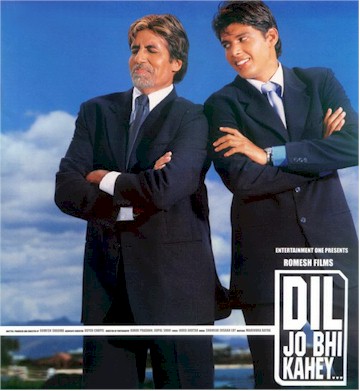
 |

However, this is not a narcissistic venture but a finely tuned family drama about the problems arising from cross-cultural, inter-racial marriages. Jai (Karan Sharma), a Mauritian of Indian descent meets Sophie (Annabelle Wallis) who is also Mauritian but of English extraction while they studying catering in Stockholm. They fall in love and return to Mauritius only to have the freedom of living abroad replaced by the constraints of society and family. Jai┬┤s mother (Revathy) - a devout and traditional Hindu and Sophie┬┤s father (Malcolm Stoddard) - a Catholic who harbours the prejudices of his colonial ancestors, polarize the families and make life difficult for the young lovers.
"When you marry will you go to a church or a temple and will your son be John or Jonardhan?" These are questions that Jai┬┤s mother puts to him when he insists on marrying for love rather than for family and it┬┤s no exaggeration that these and similar dilemmas face many who enter relationships with partners from different cultural and ethnic backgrounds. The more diverse the background the greater the risk that one or both partners must give up something of their cultural identity be it in terms of location, language or custom. The film however, takes the realistic view that change is inevitable and needs to be met with"wisdom and marurity". Some of the finest speeches are delivered with measured brilliance by the great mediator, Jai┬┤s father - Amitabh Bachchan.
Sadly, with its focus on Karan┬┤s role and emphasis on the dynamics in the Sinha home, the sreenplay and direction of the film neglect corresponding developments in the English-speaking Besson household. Bombay cinema has come a long way from the images of chainsmoking, depraved westerners shown in films like Purab aur Paschim (1971) but there is still a journey ahead if it wishes to reach western audiences. Where Sandhya and Shekhar Sinha are given the light and shade of well developed characterisation, Norman Besson and his wife are stuck with melodrama based on "half-baked" motives. Not only are their roles less interesting, the actors haven┬┤t been given sufficient direction or perhaps haven┬┤t the skills to convey heightened emotions with the needed level of conviction.
Karan Sharma moves well but is not a dancer yet. So, unlike Hrithik┬┤s debut, Karan┬┤s highlights his acting skills. The role of Jai is within the realms of his experience and capabilities and he consistently reaches the mark as a lover, dutiful son or a young man torn between the two women in his life. What┬┤s refreshing here is that it┬┤s a twenty something actor who is playing someone his own age instead of a middle-aged actor pretending to be much younger (but don┬┤t get me wrong, we still love them for that!)
In keeping with Karan┬┤s strengths, dancing has been minimised and and the picturisation of songs has consequently been given a very real look. There┬┤s only a brief dip into fantasy which touches on the unrequited love of Bhumika Chawla┬┤s character. To extend the realism, colours have been kept within the blue-green muted range. It┬┤s a technique that was employed to good effect in Swades but one that might be akin to draining the life-force from Bollywood films for those attracted to their customary vibrance. The Holi celebration in particular was a little anaemic and parts seemed to be very reminiscent of Baghban. This is a criticism of the bland picturizations and not of the songs themselves because the score written by Shankar-Ehsaan-Loy is quite crisp and tuneful.
Despite some uneven performances and lacklustre picturizations the film works where it matters most in portraying disharmony brought about by racial and cultural intolerance. Its retrospectively told, well paced narrative with a nice twist at the end easily sustains a second viewing. Karan Sharma┬┤s acting career is clearly off to a good start.
|
| Comments | Contact Us | Advertise | Terms of Service | Privacy Policy |